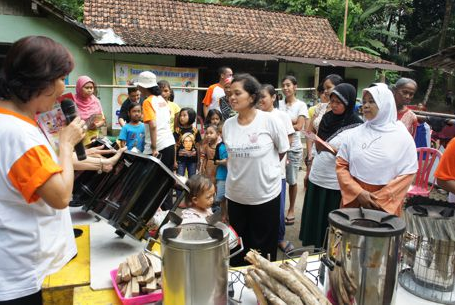Renewable Energy
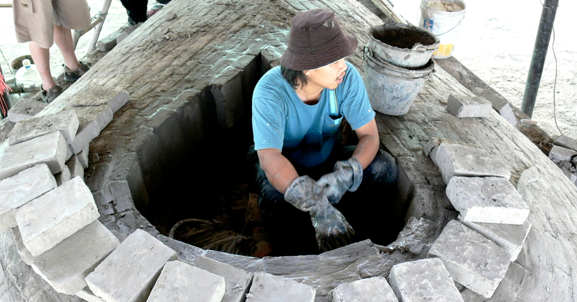 YDD focuses on the improvement, development, and production of appropriate technologies to reduce energy consumption.
YDD focuses on the improvement, development, and production of appropriate technologies to reduce energy consumption.
YDD’s present activities focusing on renewable energy include:
- Household Energy: Improvement of cooking stove technology which includes the use non-oil materials and in-house air pollution.
- Power Generation: Production of power/electricity to support community livelihoods such as local small industry and the processing of agro products. For example, use of biomass (such as agricultural waste) to generate power; use of solar energy for agro processing; use of solar energy for sea water desalination, etc.
- Networking & Capacity Building: Developing networks and building the capacity of stakeholders dealing with household energy in the region.
Household Energy
Throughout Southeast Asia, biomass, such as wood, agricultural waste, and charcoal, is a common energy source for household cooking. According to a 2010 national socioeconomic survey conducted by the Central Bureau of Statistics (BPS), approximately 24.5 million or 40 percent of Indonesian households still use biomass fuel (wood fuel). These are generally households in rural and low-income areas.
Most often, cooking is done with stoves that use biomass inefficiently, resulting in the stripping of local natural resources and more time and energy spent gathering wood. Inefficient stoves emit dangerously high levels of smoke, presenting a major health risk that disproportionately affects women and children who spend many hours a day near the stoves, often in poorly ventilated kitchens.
At present, projects revolve around developing and disseminating low-cost cookstoves with improved energy efficiency, reduced smoke emissions and simplified mass production.
Partnership in the Indonesia Clean Stove Initiative (CSI)
Since August 2014, YDD has been engaged in the implementation of the Indonesia Clean Stove Initiative (CSI), a collaborative effort between the Directorate General of New Renewable Energy and Energy Conservation, the Ministry of Energy and Mineral Resources of Indonesia and the World Bank. This initiative aims to scale up access to clean and efficient cooking in Indonesia, with focus on the 40% population who still rely on traditional biomass for cooking. Currently in its pilot stages, this program targets those most vulnerable in the Central Java Province and Special Region of Yogyakarta.
YDD has been assigned the Pilot Program Clean Cookstove Testing Center, where stoves that have been submitted by a third party are tested against government-imposed standards of CO2 and PM emissions, safety and durability. Stoves that pass the test receive government accreditation and are marketed within the CSI program. In addition to testing activities, YDD conducts market/consumer behavior analysis for market aggregators and arranges trainings, and through the Aliansi Tungku Indonesia (Indonesia Stove Alliance), facilitates members to promote the adoption of clean cookstoves.
For more information about the CSI program, visit Aliansi Tungku Indonesia (Indonesia Stove Alliance).
Click here to watch YDD and the Indonesia Clean Stove Initiative featured on JogjaTV!

 Stove Tester operates the stove based on the testing procedures set by the Indonesian government (top left). Monitoring of clean cookstove usage in the household (top right).
Stove Tester operates the stove based on the testing procedures set by the Indonesian government (top left). Monitoring of clean cookstove usage in the household (top right).
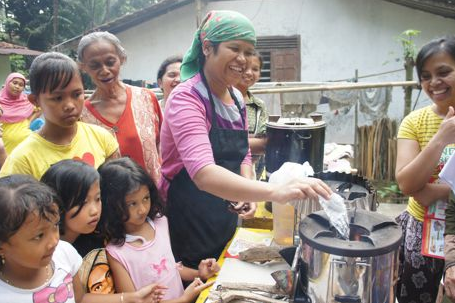 Promoting clean cookstoves in Purworkerto, Central Java (top left). Local user participates in promoting clean cookstoves (top right)
Promoting clean cookstoves in Purworkerto, Central Java (top left). Local user participates in promoting clean cookstoves (top right)
Power Generation
The energy division is also exploring biomass gasification as an alternative energy source, in cooperation with APEX. Dian Desa has built a fluidized-bed biomass gasifier as a prototype for research and development. Dian Desa is using this technology in North Sumatra to build a large-scale system utilizing waste from a coconut palm plantation to generate electricity. Likewise, small-scale biomass gasification is being explored for powering household cookstoves.
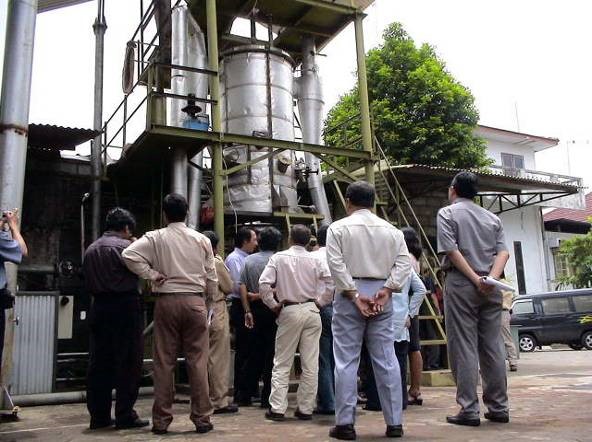
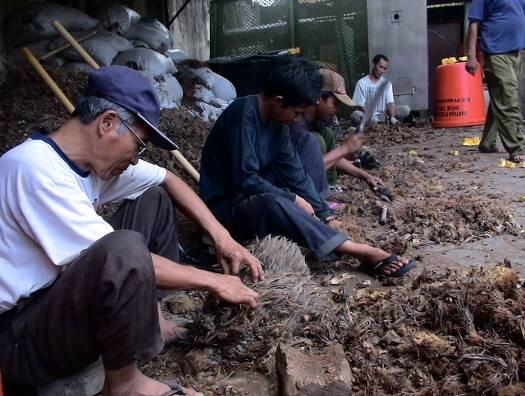
During a workshop on biomass gasification at YDD, participants watch a demonstration of the fluidized biomass gasification system that was built in Dian Desa’s metal workshop (top left). Workers prepare coconut husks as fuel for the gasifier (top right).

